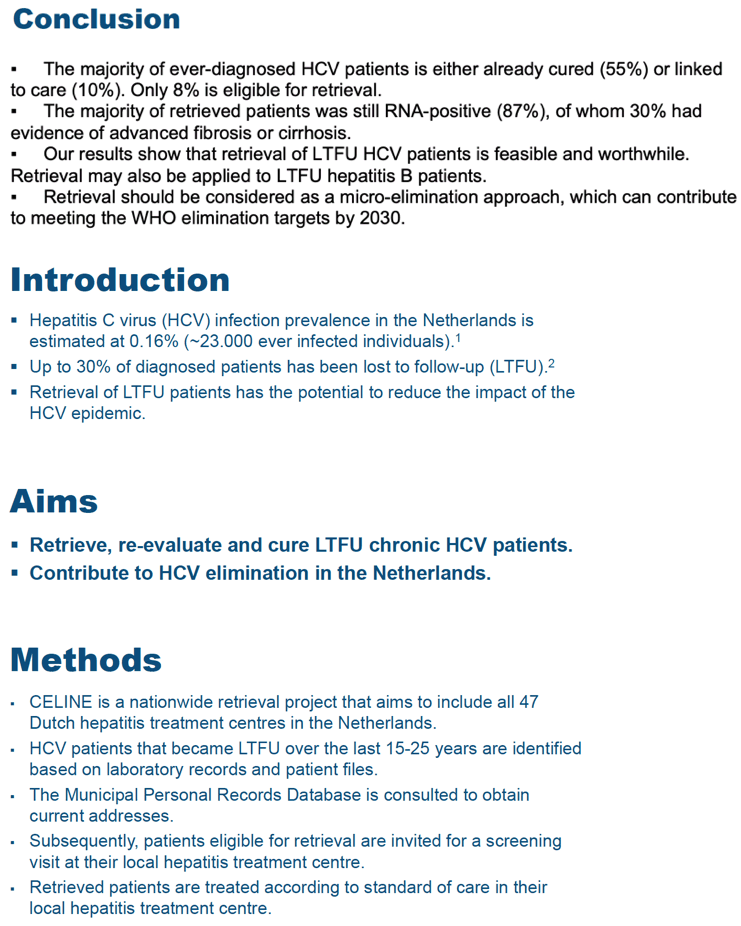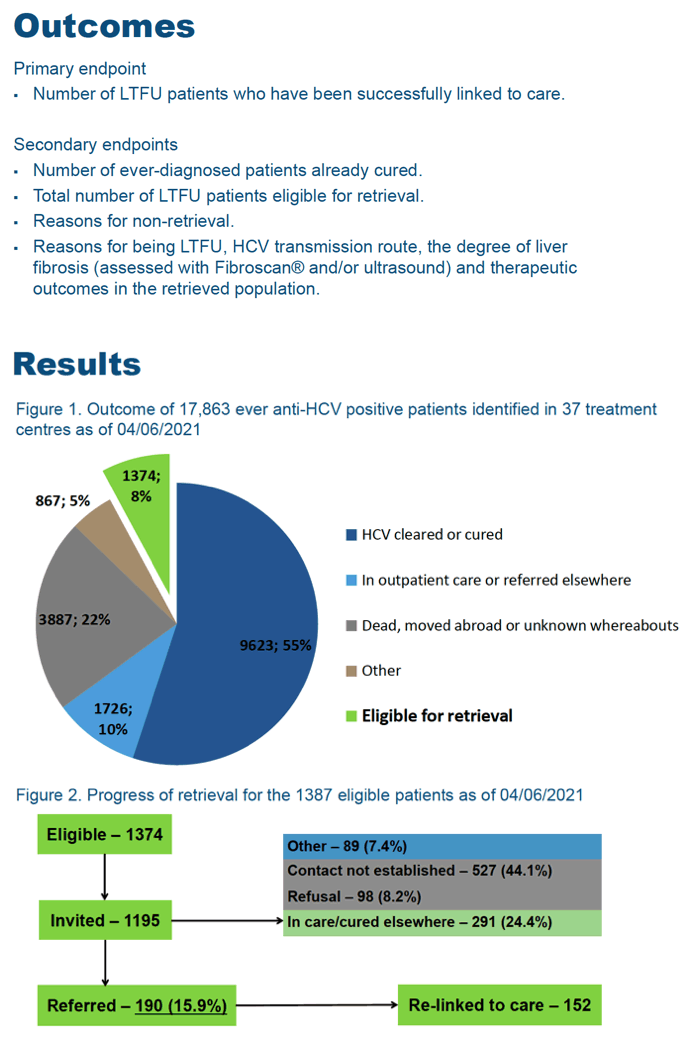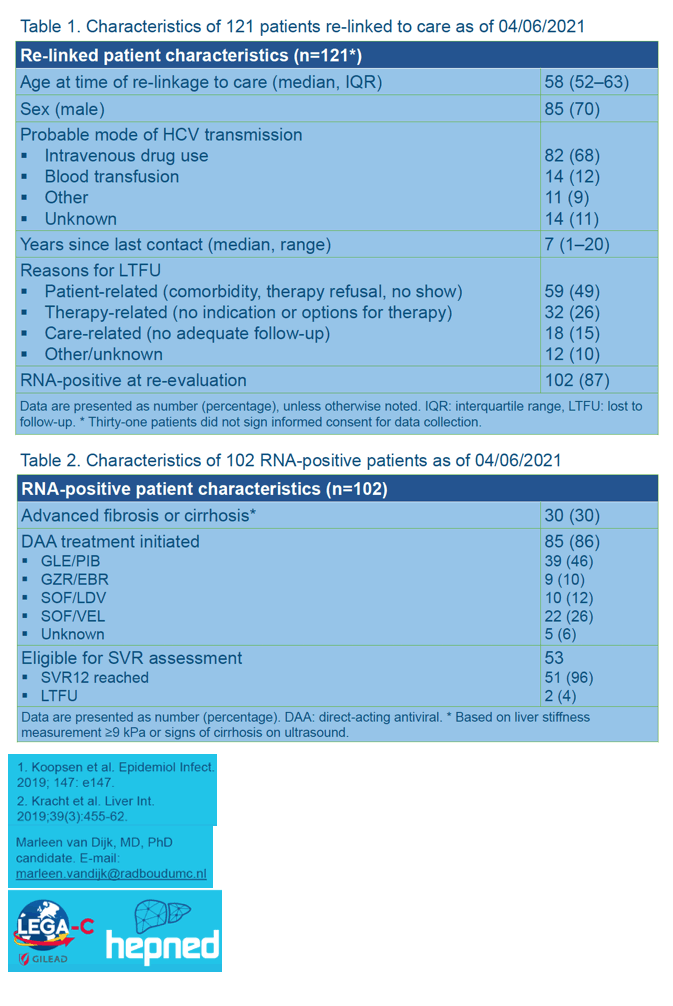 |
 |
 |
| |
Hepatitis C Elimination in the Netherlands (CELINE):
nationwide retrieval of lost to follow-up chronic hepatitis C patients
|
| |
| |
EASL International Liver Congress, June 23-26, 2021 JNJ-3989
Marleen van Dijk1, Cas J. Isfordink2,3, Sylvia Brakenhoff4, Johannes E. Arends5, Robert De Knegt4, Marc van der Valk3, Joost Ph Drenth . Radboudumc, Gastroenterology and Hepatology, Nijmegen, Netherlands; 2University Medical Centre Utrecht, Gastroenterology and Hepatology, Utrecht, Netherlands; 3Amsterdam Infection and Immunity Institute, Amsterdam University Medical Centre, Internal Medicine, Division of Infectious Diseases, Amsterdam, Netherlands; 4Erasmus Medical Centre, Gastroenterology and Hepatology, Rotterdam, Netherlands; 5University Medical Centre Utrecht, Infectious Diseases, Utrecht, Netherlands

from program abstract
Background and aims: Hepatitis C virus (HCV) prevalence in the Netherlands is estimated at 0.16%. Presumably, up to 30% of the diagnosed population has been lost to follow-up (LTFU) before being cured. Retrieval of LTFU patients has the potential to reduce the impact of the HCV epidemic. Therefore we initiated the nationwide retrieval project CELINE, aiming to achieve HCV micro-elimination in previously diagnosed but LTFU HCV patients.
Method: LTFU patients were identified by consulting laboratory and patient records of up to 15 years old in hepatitis treatment centres and, when possible, public health or primary care laboratories and other hospitals. Subsequently, the Municipal Personal Records database was consulted to identify patients eligible for retrieval, defined as being alive and having a known Dutch residence. These patients were invited for a screening visit at their local hepatitis treatment centre. Primary end point was the number of LTFU patients successfully re-linked to care.
Results: So far, 29 centres have finished the identification phase and initiated the retrieval phase, whereas in a further 10 centres CELINE has been approved. Of 15, 558 potential ever chronically infected patients, 65% had already been cured or were still in care and only 8% (n = 1, 248) were LTFU and eligible for retrieval. Currently, 942 patients have been invited for re-evaluation: 24% of these had already been successfully treated elsewhere, 5% had either severe comorbid- ity, moved abroad or were deceased precluding treatment, 8% refused to be re-evaluated and in 45% contact has not (yet) been established. So far, 160 patients (17%) have been screened or have an outpatient care appointment scheduled. At their screening visit, patients were mostly male (69%), median 58 years old, LTFU for median 7 years (IQR 4-11) and intravenous drug use was the predominant HCV transmission route (68%). At re-evaluation, 86% tested HCV RNA positive and none HIV positive. Of those HCV RNA positive, 30% had a Fibroscan measurement indicating advanced fibrosis or cirrhosis (≥9.5 kPa). So far, 79% of RNA-positive retrieved patients have commenced HCV treatment.
Conclusion: The majority of ever diagnosed HCV patients in the Netherlands has already been cured, while only 8% is LTFU and eligible for retrieval. So far, we have re-linked 160 patients (17%) to care, with 30% of HCV RNA positive patients showing signs of at least advanced fibrosis. This demonstrates that retrieval of LTFU HCV patients is feasible and worthwhile.


|
| |
|
 |
 |
|
|